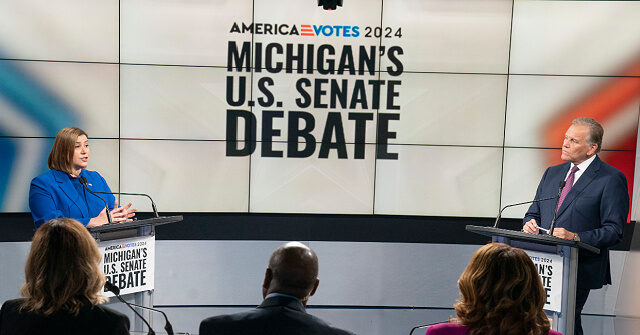In the recent U.S. Senate debate, former Representative Mike Rogers (R-MI) sharply criticized his opponent, Representative Elissa Slotkin (D-MI), for her assertions regarding the efficacy of a Senate immigration bill in securing the U.S. southern border. Slotkin claimed that there was a “deal on the table” that would enhance border security, referring to a bipartisan bill currently being discussed by Senate Democrats. She emphasized the urgent need for action, suggesting that infrastructure improvements and legal reforms were vital for strengthening border protections.
Rogers, however, contested Slotkin’s claims by noting that the proposed border bill had failed to pass in the Senate and could potentially worsen the immigration crisis. He characterized the legislation as flawed and warned that it would facilitate up to 5,000 border crossings per day before an emergency could be announced. He accused Slotkin of misleading voters about the implications of the bill and described it as a “terrible” proposal that would guarantee the influx of two million illegal immigrants each year. Rogers declared such terms as “nonsense” and insisted that they represent a fundamental misunderstanding of the reality on the ground.
In his critique, Rogers emphasized the need for more serious approaches to border security, highlighting personal anecdotes to underscore the human cost of the ongoing immigration crisis. He called attention to the distressing experiences of families affected by violence related to illegal immigration, asserting that Slotkin’s views lack the depth and seriousness needed to address the real-world consequences of such policies. He encouraged a more urgent and comprehensive response instead of mere proposals or discussions about potential legislation.
Another focal point in Rogers’ argument was the need to reinstate the Trump-era Remain in Mexico policy, which required asylum seekers to wait in Mexico while their claims were processed in the U.S. He criticized the Biden administration for abandoning this policy and claimed it had resulted in a more manageable immigration situation at the border. Rogers argued that reverting to this policy could help effectively deter illegal crossings and alleviate pressure on border resources.
Slotkin’s portrayal of the situation as a manageable problem contradicted Rogers’ dire warning about the implications of non-action. He indicated that merely proposing new legislation without tackling the existing issues would only exacerbate the crisis. By framing the debate in personal and human terms, he aimed to highlight the stark consequences of mismanagement and the politicians’ responsibility to act decisively in protecting American families.
Ultimately, the debate highlighted the division between Republican and Democratic viewpoints on immigration reform. While Slotkin expressed a desire for bipartisan solutions and improvements to existing policies, Rogers maintained that only decisive and immediate action could address the ongoing crisis. His call for the reinstatement of prior policies and a firm stance against illegal immigration underscored a broader appeal to get tough on border security and ensure accountability among elected officials. This confrontation between the candidates reflects a crucial and contentious issue in contemporary American politics, one that continues to shape the national dialogue on immigration and border security.

